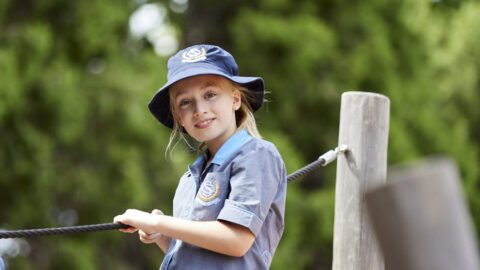From the Principal – Can I Play?

It was a pleasure to welcome our Barbreck parents back on campus to attend our Junior School Information Evening on Tuesday, and together with the newly appointed PFA President, Mr Kevin D’Souza, enjoy the celebratory social evening on the Village Green, with our ELC parents also in attendance.
As we embrace the fullness of returning to school life on campus this year, there remains the shadows of the extended lockdowns that we recently endured. As educators we are continually intrigued by the question: How is the interruption to education that COVID-19 has presented going to alter the learning trajectories and behaviours of Australian children?
As we step forward this year, I am also keen to understand the social development of young people. Learning the social nuances of one’s interactions with others usually relies on face-to-face conversation. With faces now hidden behind masks for most parts of the day, how do children learn the subtleties and intricacies of conversation?
I was also reminded this week of the lost opportunities owing to COVID-19 when I accompanied one of our Year 4 Barbreck girls returning from her first Tennis lesson in two years. Strolling together along St Catherine’s Walk, she slipped her bright pink racquet into its cover, and shared with me her nervous apprehension of returning to Tennis, as her “forehand was no longer as good.” With perseverance and practice, I assured her it would improve, and most importantly, applauded her efforts for returning to her Tennis lessons after the enforced COVID-19 break.
During lockdowns we observed teachers working diligently to maintain the routine of academic lessons, as well as providing opportunities to continue developing physical and gross motor skills gained from Physical Education classes whilst at home, with our Barbreck Coordinator of Sport, Mr Tom Crebbin, assembling elaborate orienteering activities in local parks, and our Music tutors watching, listening and providing feedback, perched on the edge of piano keys via iPad virtual lessons.
As we step forward out of the shadows of multiple lockdowns, it is now time for parents, together with teachers, to earnestly encourage our girls to return to the pursuit of their Co-curricular passions with vigour.
It is often through the individual endeavour of participating in activities such as sport, performing arts, debating and community service, that children and young teenagers shape their strong sense of identity. The consistent participation of a Saturday netball game, a much-loved weekend family ritual, serves to create routine, family connection and encourages commitment to coaches and peers. Likewise, committing to a regular rehearsal for a Music Ensemble, or conquering the fear of being third speaker in the Debating Team, these pursuits shape who we are as young people and have been a void in the life of many over the past two years.
It would have been easy for my Year 4 Barbreck buddy to ‘not bother’ going back to her Tennis lessons, an emerging passion lost through the COVID years; or for that matter the trombone lessons, the dance class or Swimming training. I encourage all girls now that they have settled into their classes at School to lift their gaze and ask their parents, ‘can I play..?”
COVID Update
This week the State Government announced further information pertaining to COVID-19 Safe practices implemented at schools. The start of the school year has been considered safe and successful, and the anticipated rise in COVID-19 infections has thankfully not resulted in high numbers. At St Catherine’s, our numbers remain relatively low with correspondence only necessitated with families directly impacted.
The twice weekly measure of rapid antigen surveillance testing that was initially set to run for the first four weeks of Term 1 will now continue until the end of term. The school surveillance testing program has been extremely effective at reducing transmission in schools – with Burnet Institute modelling estimating that, assuming a 75 per cent compliance rate with screening of students, the program has prevented more than 21,000 COVID-19 infections across Victoria.
The testing settings will remain the same, with all primary and secondary school students and staff, and early childhood education and care staff, as well as children aged 3 to 5, recommended to test at home, twice a week. Further Rapid Antigen Tests will be distributed to the students in the coming week.


